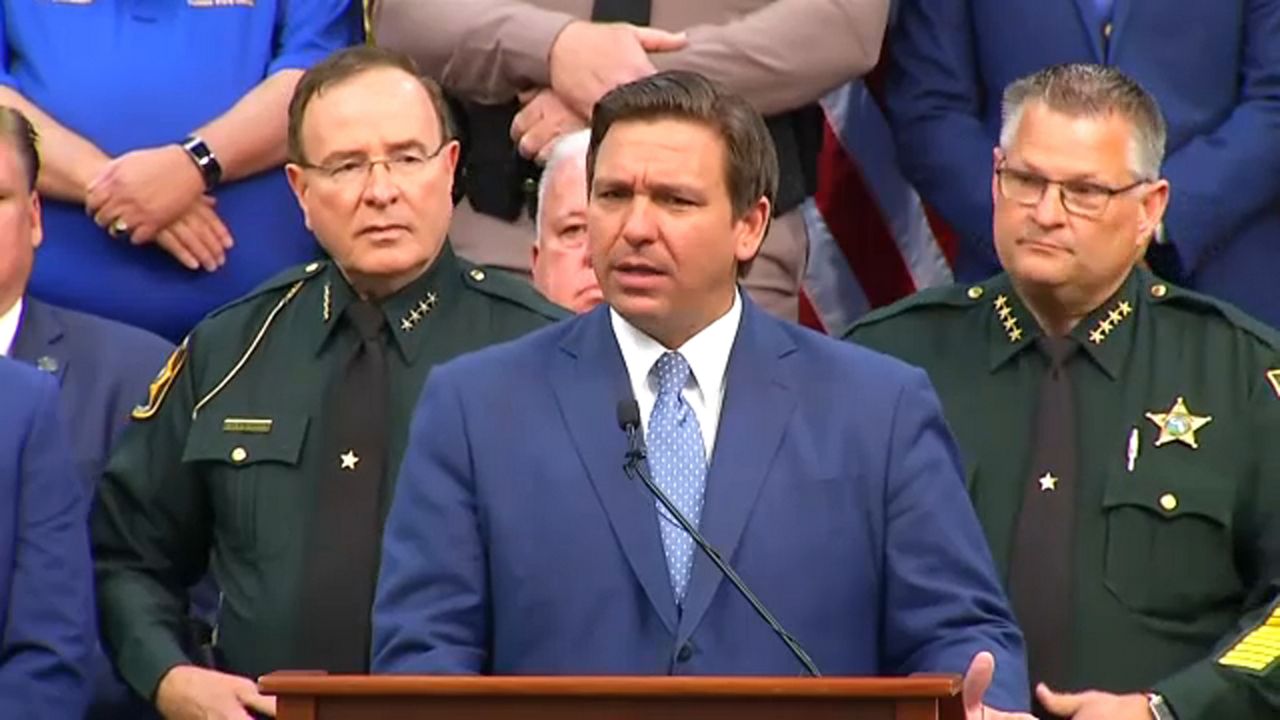ORLANDO, Fla. — Three days after becoming law, an Orlando civil rights attorney is challenging Florida’s new “anti-riot” law in court.
What You Need To Know
- Gov. DeSantis signed HB 1 on Monday, which defines a riot and increases penalties
- Federal lawsuit claims HB 1 violates First Amendment rights
- Gov. DeSantis, AG Moody and Orange County Sheriff John Mina named as defendants
- RELATED: Gov. DeSantis signs Florida's controversial 'anti-riot bill' into law
Attorney Aaron Carter Bates filed a federal lawsuit Wednesday in Orlando, contesting the“Combating Public Disorder Act”, also known as the “anti-riot” law.
The suit names Governor Ron DeSantis, Attorney General Ashley Moody, and Orange County Sheriff John Mina as defendants, in their official capacities.
The suit, filed on behalf of "Lawyers Matter Task Force" argues CS/House Bill 1 violates the U.S. Constitution.
“These statutes are unconstitutional on their face and as-applied to Plaintiffs’ planned speech and expressive conduct because: (1) they target protected speech under the First Amendment; (20) they are written with the intent of defining any such protest as a “riot” or participation in such protest as “inciting a riot”; and (3) they retaliate against those subjected to these laws with excessive bail, fines, or cruel and unusual punishment as a means of hindering the speech of dissenting opinions,” the lawsuit states.
When signing the bill Monday, DeSantis called it “the strongest, anti-rioting, pro-law enforcement piece of legislation in the country.”
The governor and the Republican-controlled Florida Legislature made passing the effort a top priority.
State Rep. Randy Fine, R-Palm Bay, said unrest following the death of George Floyd across the nation was the impetus of the bill.
“We said, ‘Look if you want to protest anything, please go ahead and do it, but we are not going to put up with looting, we are not going to put up with riots,” Fine said.
The new law increases penalties for those who target law enforcement and participates in violent or disorderly assemblies, as well as obstructing highways and roadways.
The controversial 61-page law defines “riot” as when three or more people “willfully participates in a violent public disturbance”…”acting with a common intent to assist each other in violent and disorderly conduct, resulting in (a) injury to another person; (b) damage to property; (c) imminent danger of injury to another person.”
The bill does more than just define a riot.
It also makes it more difficult for local governments to reduce law enforcement budgets; opens local governments up to lawsuits if its deemed they failed to stop a riot; and allows those arrested for ‘rioting’ to be held in jail until their initial court appearance.
Critics long argued during the legislative process the measure was unconstitutional and was seen as an effort to suppress the speech of minorities.
“The purpose of these laws are nothing more than an attempt to silence the Black Lives Matter movement and other civil organizations by limiting the ability to protest,” Bates said in a statement. “The First Amendment is a pillar of American democracy, and the “anti-riot” laws clearly strip Floridians of their freedom of speech and right to assemble.”
“The bill unconstitutionally targets protected speech, including protests against the murders of minorities at the hands of police officers – including the murders of George Floyd, Breonna Taylor, and Elijah McClain, which cannot be properly characterized as 'directed to inciting or producing imminent lawless action and a likely to incite or produce such action',” the lawsuit states. “The bill unconstitutionally threatens to impose liability on individuals expressing their rights to free speech regardless of their intent to incite violence, the likelihood that their speech will result in violence, or the imminence of the intended violence.”
The suit says the law is “overbroad” and “vague”, while drawing examples to South Dakota and Virginia who faced courts striking down their versions of anti-riot laws.
Gov. DeSantis' office says he has not yet been served the suit.
"But we will firmly defend the legal merits of HB 1, which protects businesses, supports law enforcement, and ensures punishment for those who cause violence in our communities," said spokesman Cody McCloud.
A spokesperson for the Attorney General’s office told Spectrum News: “As the Attorney General, it is our office’s role to defend duly enacted state laws. As this litigation is pending, we cannot comment further.”
As for the third defendant, Orange County Sheriff John Mina, the sheriff's office contests even naming him to the suit.
“As it relates to Sheriff Mina, this lawsuit is without merit,” an OCSO spokesperson told Spectrum News in a statement. “The sheriff is not a proper party to this lawsuit. Accordingly, we intend to file a Motion to Dismiss.”
